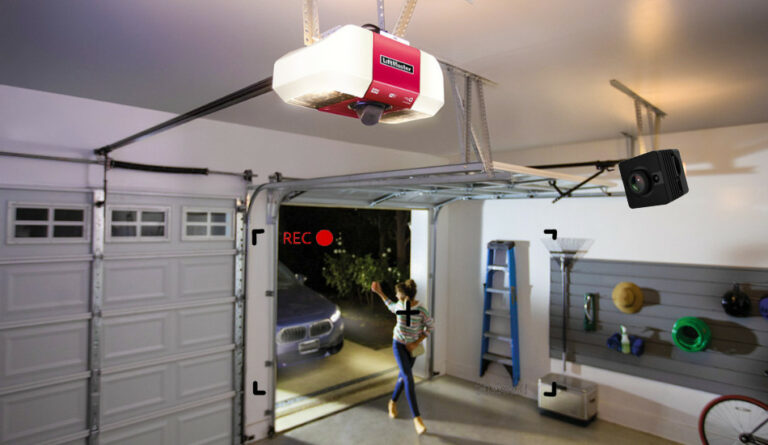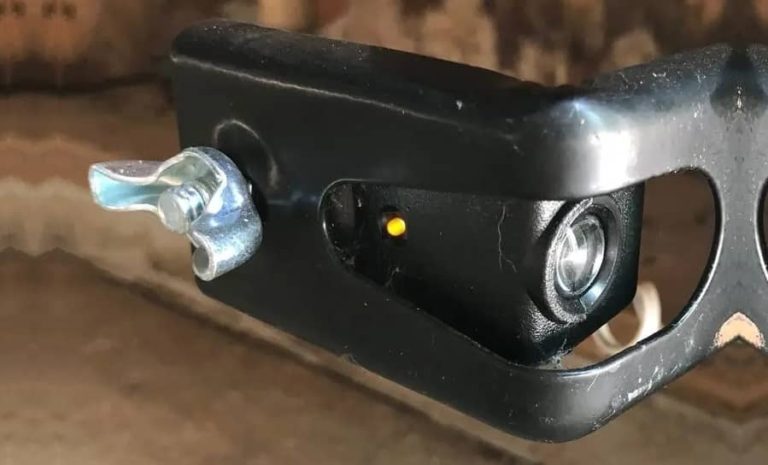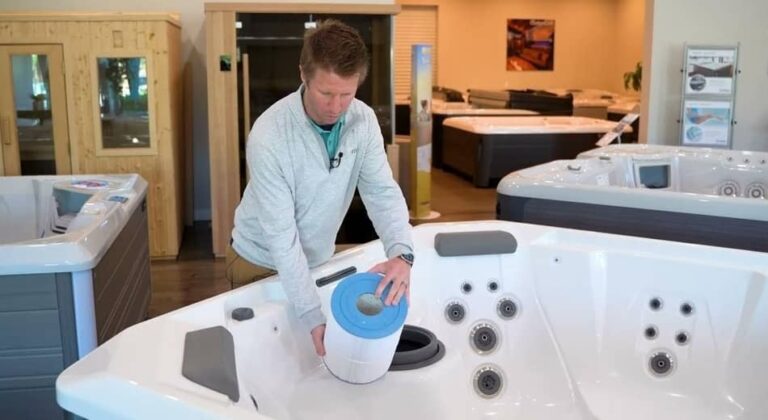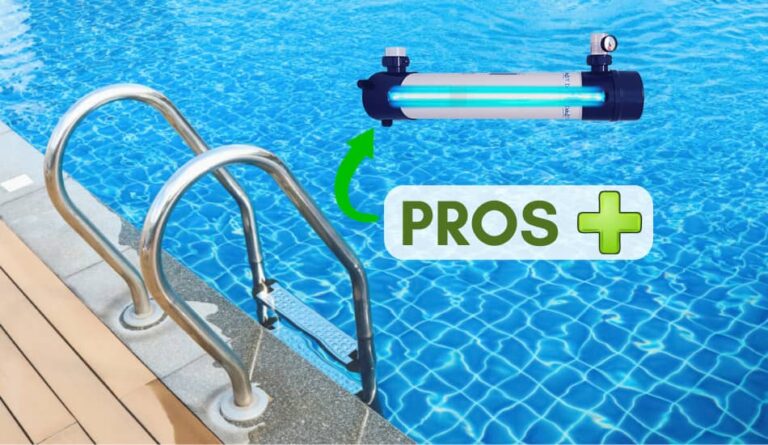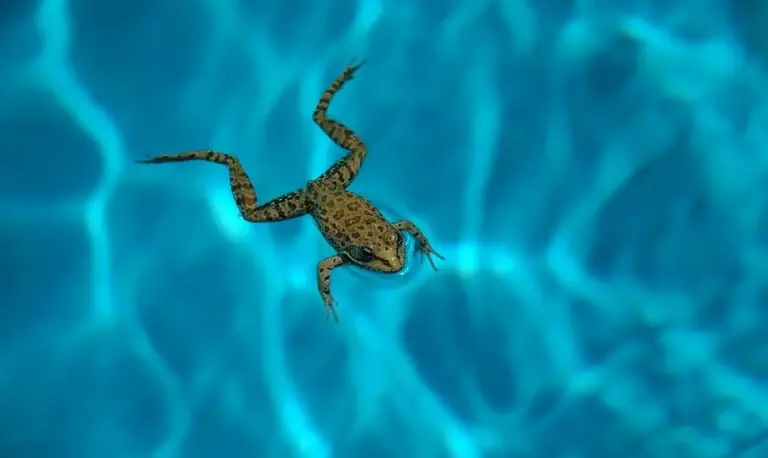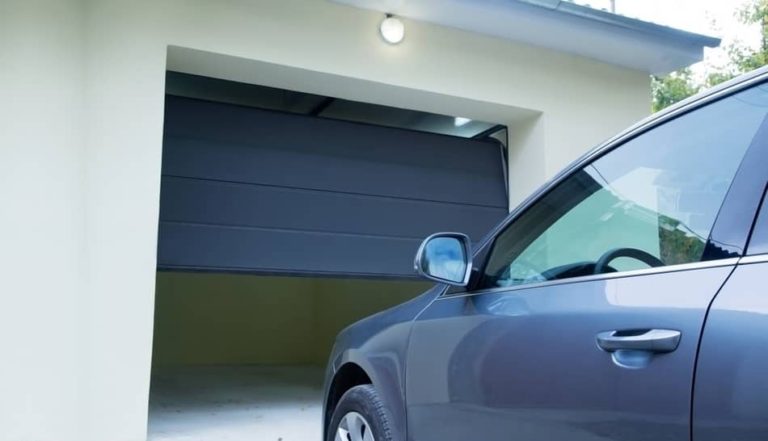7 Disadvantages (Cons) Of Pool UV Systems
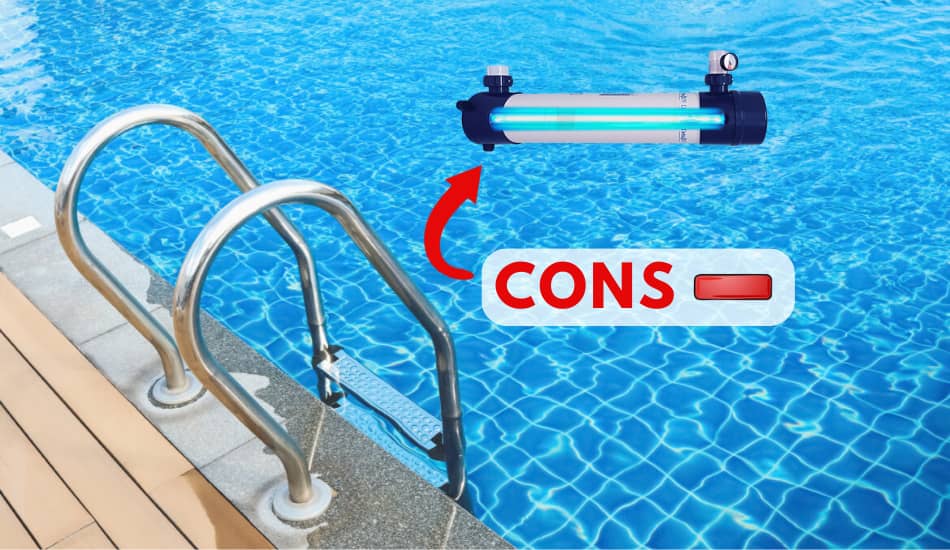
If you have a pool and you’ve decided to get a pool UV system, there are some things you should know before installing it. Although the UV system offers many advantages to the pool, such as reduced use of chemicals, it also has its drawbacks. Of course, this does not mean that this system is bad for your pool.
To better understand these drawbacks, we need to go into a little more detail. So, below, we’ll review some of the things you need to know about these UV systems. So, let’s start!
In short, here are the 7 disadvantages of pool UV systems:
| Cons of Pool UV Systems | Description |
|---|---|
| 1. UV Lights are Expensive | Replacing UV bulbs can cost you a lot of money. |
| 2. UV Systems Requires Maintenance | Regular upkeep is needed to ensure UV systems work efficiently. |
| 3. UV System Doesn’t Last Forever | Over time, an in-ground UV system will need replacement. |
| 4. UV Does Not Oxidize Water | Unlike some systems, UV doesn’t break down contaminants, leading to irritations. |
| 5. UV System Is Not Working All The Time | The UV system functions only when the pool pump is active. |
| 6. UV Light Can’t Handle Large Contaminants | UV systems aren’t effective against larger contaminants or debris in the pool. |
| 7. UV Light Become Less Effective | Over time, the UV light becomes less effective and will not work at 100%. |
Table of Contents
What Are Pool UV Systems?
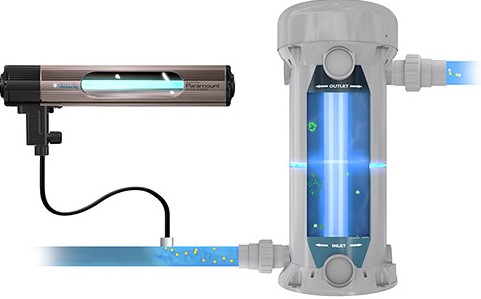
In-ground Pool UV systems are systems that use special lights that are set up around the edges of the pool. These lights send out ultraviolet rays that travel through the water. When these rays touch any tiny unwanted microorganisms or bacteria in the water, they alter their DNA, stopping them from spreading and then getting rid of them. Also, these lights won’t change how your pool looks. It’s because they’re usually put at the bottom edge of the pool walls so they won’t disturb the pool’s appearance.
Related Article: 7 Advantages (Pros) Of Pool UV Systems
How Does a Pool UV System Work?
Think of the UV system as a special security system for your pool. It turns on right after the usual pool cleaning filters. As water flows, UV light shines on it inside a sturdy graphite container. This light is super powerful and removes bad things in the water, like tiny germs, mold, mildew, and even bacteria.
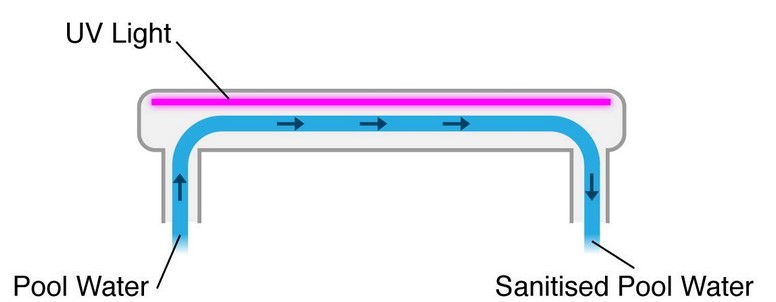
The cool thing? Even the tiniest unwanted (pathogen) things in water can’t handle this UV light. It’s so strong that it also breaks down stuff called chloramines, which can sometimes make our skin itchy or our eyes red when we swim.
Even if you have a UV system, you still need to use stuff like chlorine to clean the pool, but guess what? You’ll need way less of it! And remember, if you clean your pool regularly, you’ll use even fewer chemicals.
Now, you might wonder, is UV light safe? Don’t worry! The UV light stays inside its graphite chamber, so it doesn’t touch us or the water we swim in. This means it’s a safe and smart way to help keep our pool water clean. Plus, the best part? You won’t need to fix or check on it too often. It requires low maintenance.
7 Cons of Using Pool UV Light Systems

Although the pool UV system makes pool maintenance easier and reduces the intake of various chemicals, it also has some drawbacks. According to experts installing these systems in swimming pools, we will list 7 cons you should know. Here are some of them:
1. UV Lights Are Expensive
One concern with UV lights is their price. Changing the bulb can be quite pricey, sometimes going up to $150 just for the bulb. When switching out the old bulb for a new one, you need to be careful. It’s important not to touch the bulb with your hands because it can reduce its lifespan.
This process of switching the light can be a little tricky if you’re attempting it on your own, especially for the first time. It might be a good idea to call a professional who knows their way around UV systems and how to handle the bulb replacement for you. This will cost you even more money in the end.
2. UV Systems Require Maintenance
Like many pool equipment, UV systems need regular maintenance to keep them functioning at their best. Over time, the UV bulbs wear out and lose their effectiveness, necessitating periodic replacements. Additionally, the system must be checked for potential issues or malfunctions.
By keeping up with this routine maintenance, pool owners can ensure that the UV system remains efficient in neutralizing harmful microorganisms and providing a clean swimming environment.
3. UV System Doesn’t Last Forever
Setting up an in-ground pool UV system doesn’t mean it’ll last a lifetime. Whether you get a brand-new system or update an older one, it must be replaced after some time. The UV light is great at eliminating harmful bacteria and algae, but this means you’ll need to change it out every year.
4. UV Does Not Oxidize Water
Even though UV systems might be called ‘low intensity’, they still do much of what chlorine does. But, here’s a drawback of UV systems: they don’t clean the water completely. Ozone systems clean the water and remove stuff that causes skin and eye irritation. UV doesn’t do this part. Instead, UV just gets rid of tiny harmful creatures in the water.
5. UV System Is Not Working All The Time
Another thing to note is that UV doesn’t work continuously. The UV chamber is near your pool equipment, so when the pump stops, UV stops killing the tiny microorganisms. Nowadays, many pools are designed to keep water moving all day with special pumps.
However, if you have an older-style pool that works 8-12 hours daily, UV only does it when the pump’s on. When the pump’s off, you’re counting on the chlorine to keep the water clean.
6. UV Light Can’t Handle Large Contaminants
UV light systems are primarily designed to target and neutralize microorganisms like bacteria and algae. However, when it comes to larger contaminants or debris, such as leaves, insects, or dirt, UV lights are not effective.
These systems rely on ultraviolet rays’ penetrative power to disrupt tiny organisms’ DNA, but they can’t physically remove or break down larger particles. For this reason, UV systems are typically used in conjunction with filtration systems, ensuring both microscopic and macroscopic contaminants are effectively managed in the pool.
7. UV Light Become Less Effective
Over time, the effectiveness of UV lights becomes less effective. This decline isn’t always immediately noticeable, as the light can still turn on and appear functional. However, prolonged use decreases the intensity and ability to kill harmful microorganisms. Regularly replacing UV bulbs ensures the system remains at its optimal performance.
Related Article: 10 Pros And Cons of Pool UV Systems
How Much Does A Pool UV System Cost?
Generally, a UV pool system costs around $1,000 without installation. Setting it up might cost anywhere from $500 to $1,000, depending on the system and your living area. The price can also change based on your pool’s size, the amount of water it holds, and how your current pipes are.
If you want to learn more about this UV System, be sure to watch this YouTube video:
Related Article: How To Clear A Cloudy Pool With Baking Soda?
FAQ: People Also Ask
Is a pool UV system worth it?
UV light kills bacteria and other tiny bad things by changing their DNA structure. But it’s safe for humans because the UV light stays inside the container and doesn’t touch the swimmers. Using UV helps to lower the number of chemicals in the pool.
Are pool UV pools safe?
The technology behind UV-C is pretty safe for cleaning pool water. It uses UV light to ensure the water is clean, and the best part is that no yucky side-products come from it, unlike some chemical cleaners. Plus, there’s no worry about using too much UV-C light.
Final Thoughts
To sum up, while there are certain downsides to these pool UV systems, we believe their advantages surpass these drawbacks. The significant cutback in chlorine, especially when paired with an ozone system, is impressive.
Many of today’s public pools and city water systems have installed UV and Ozone systems for a reason. Whether for swimming or drinking, their purpose is pretty much the same: cleaner water. Using a UV system and ozone together means less chlorine and chloramines in your water. I hope this article has helped you, and if you have more questions, feel free to comment below.


